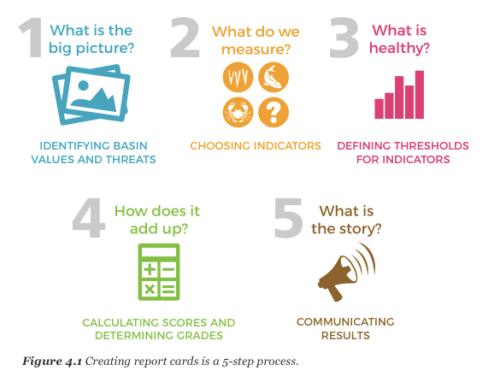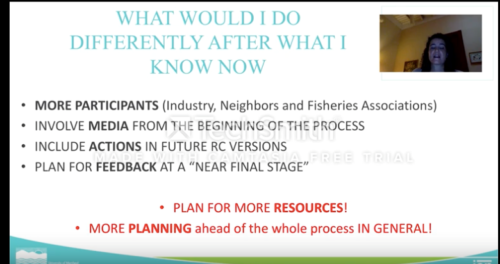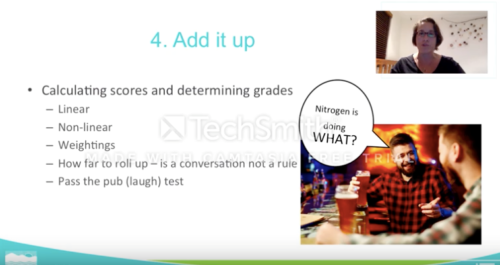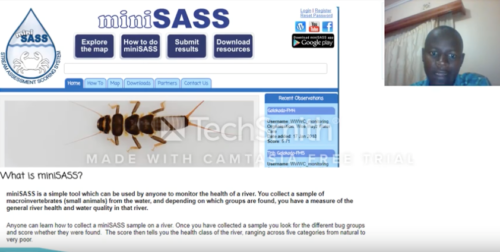Last but not least... Now that you know, it's time to work!
Ximena Celis · | Environmental Report Cards | 2 commentsXimena Celis
In our last session for the IAN Healthy Rivers for All course, we reviewed and discussed the final project video presentations of all the participants. All seven presentations were great and they all reflect the understanding we gained from this useful course. Everyone said that, moving forward, they will definitely use the 5-step report card process, so good job Bill, Simon, and Heath!!!

There were several key themes and take-home messages that emerged from the presentations. For example, Irina told us what she will do differently when developing report cards in the future, considering what she knows now from the course. She plans to recruit more participants, involve the media from the beginning of the process, include recommendations on the report card that highlight ways people can help improve future grades, carefully plan resource use (financial and human), and remember the importance of telling a good story.

Chanda and Jodie both emphasized the importance of asking the question, "Why do I need to do a Report Card?" from the beginning, and revisiting this question periodically throughout the entire process. Chanda also spoke about the need for transparency in all stages of report card development, and plans to use the stakeholder continuum to try to gather more partners and supporters (Make Mes, Convince Mes, etc.). Ximena said that it has been helpful to be part of a strong, passionate, and established team that has been working in the basin for a decade because what really helps engage the public and garner their support is creating a good relationship and reputation with stakeholders. Many of the blogs from our course emphasized the process of report card development (rather than the product, itself), and shared the opinion that the most important outcome of report card development is not obtaining a grade, but is forming partnerships and raising awareness.
During her presentation, Nancy shared her goal of continuing to take small steps forward during the early stages of report card development, and noted that sometimes linear timelines are not the best way to gain momentum in the very beginning stages. Instead, simultaneous efforts at fundraising, reflection on previous report card efforts, and persistent stakeholder recruitment may prove to be a more effective strategy. In her case, it might be helpful to recruit undergraduate students to help develop her report card, as they are often knowledgeable and eager to gain experience. Jodie encouraged us to be coaches on the report card process in the future, and use our newfound understanding of the report card process to teach colleagues new skills and lead future report card efforts.

Kennedy shared that this course has given him the confidence needed to start the report card process and continue sharing knowledge with his colleagues and international partners. He spoke about the importance of identifying and retaining stakeholder 'champions' throughout the process, as well as using regionally important dates, such as holidays or festivals, to promote or launch a report card. He also shared an interesting tool for measuring river health, called miniSASS, which he plans to incorporate into his report card. Finally, Katya's presentation prompted a discussion about launching draft report cards ahead of final products, such as the Vision for a Report Card and Preliminary Results documents that were published ahead of the finalized Mississippi River Watershed Report Card. These types of early documents allow us to maintain momentum and public interest in a slow-moving project, and also provide the opportunity to receive comments and engage more stakeholders before developing and releasing the final version. We also discussed how in some cases it is helpful to release multiple versions of a report card, which are targeted towards different audiences (permanent resident vs. seasonal visitors, multiple languages, adults vs. young children or students, etc.). Finally, Katya also reminded us that it is important to leave some reflection time between stakeholder workshops in order to facilitate maximally effective and productive discussions between stakeholders.

A report card provides a status update on an ecosystem or basin's health and can often highlight areas that people can work to improve. In this sense, developing a report card is the first step in taking action to improve a place, both environmentally and for socio-cultural reasons. This course taught us many best practices for report card development and also allowed us to share our experiences and questions with others during our reflective discussions.
The diversity of geographic and cultural backgrounds of the participants enriched our class experience and allowed us to pool our knowledge to address common problems. Going forward, we all want to continue learning from each others' wins and the losses, and try to do better with every report card we make. Thanks again to Bill, Simon, Heath, and Suzi for sharing the IAN methodology and thanks also to all of my course-mates for the valuable input and discussions. Hope to see you all again!
Next Post > A Long Love Affair with The Chesapeake Bay Part II
Comments
-
Irina 8 years ago
Thank you Ximena for a nice and insightful Blog. I enjoyed it even more than I was not able to attend the session. Your Blog really helped me to feel and live the wrapping up of the course.
-
Chanda 8 years ago
Great blog Ximena! I am looking forward to doing Zambia's first report card and I have already been asked by a colleague to do a brief training or report card "crash course". We learnt a lot from each other and would be great to keep in touch as we go along so as to keep sharing lessons learnt and successes. All the best everyone!